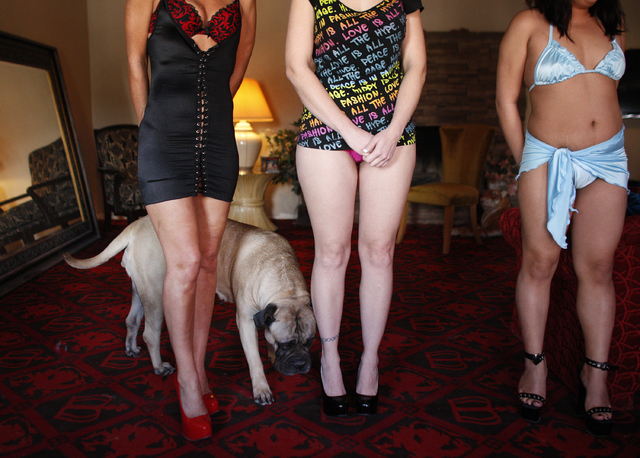Brothels no barrier to Nevada economic development
It seems the world’s oldest profession isn’t preventing the newest and most innovative businesses from coming to Nevada, after all.
U.S. Sen. Harry Reid, D-Nev., called for an end to legal prostitution in the Silver State in a speech to the Nevada Legislature in 2011. The man whose mother washed laundry for brothel workers in Searchlight said it was time to outlaw the profession because it was hurting economic development.
“Nevada needs to be known as the first place for innovation and investment, not as the last place where prostitution is still legal,” Reid proclaimed in a pitch that fell flat among lawmakers, who took no action.
Nevada has lately become a draw for both innovation and investment — despite the still-legal sex trade.
On Thursday, electric carmaker Tesla announced it would build a $5 billion battery factory at an industrial park in Storey County, not far from the infamous Mustang Ranch brothel. Hours earlier at the annual clean energy summit Reid hosts in Las Vegas, the big news was a $105 million federal loan guarantee to help Fulcrum BioEnergy construct a biofuel refinery in the same 104,000-acre Storey County industrial park east of Reno off Interstate 80.
Tesla said its factory will employ 6,500 people. Fulcrum said its $200 million plant will have 100 permanent jobs.
Notably, the director of the Tahoe-Reno Industrial Center is Lance Gilman, who also owns the Mustang Ranch brothel. Gilman has been in the brothel business for 10 years and has been the exclusive broker for the industrial center since 2000. Previously, he ran the South Meadows Business Park.
Gilman, who’s also a Storey County commissioner, helped seal the Tesla deal. On his website he touts his ability to make connections and grease the wheels for companies dealing with government agencies. He attended Sandoval’s announcement in Carson City, joining business and government leaders alike in applause.
Dennis Hof, owner of the Bunny Ranch and six other Nevada brothels, declared Friday that Reid has been proven wrong. Hof was in the audience the day Reid called for shutting down brothels, which have long sustained Nevada’s rural counties. Prostitution isn’t legal in urban Washoe and Clark counties; legal brothels are a county option elsewhere.
“Tesla is evidence that it’s okay … there’s a brothel just down the street,” Hof said. “Nevada is a great place to do business.”
Hof said businesses are sometimes reluctant to locate in Nevada because of a poor education system, lack of manufacturing infrastructure, limited resources such as water and legalized gambling.
“Brothels are like 16 on the list” of concerns, he said.
Hof theorized that Reid went after legal brothels to get back at rural counties, where he is highly unpopular. Out of Nevada’s 17 counties, Reid lost the vote in all but tiny Mineral County and the population centers of Washoe and Clark in 2010.
Or perhaps, Hof speculated, Reid is carrying water for the casino industry in Las Vegas, which he says “wants to tell the world that we cleaned up Nevada” to attract more tourism.
The very idea made Hof scoff.
“Las Vegas is America’s cesspool of sex. It’s the most disgusting town,” Hof said, claiming there are some 30,000 illegal prostitutes and 3,000 pimps working the Strip, compared to a few hundred employees of the 18 legal brothels in rural Nevada.
Eric Herzik, a political science professor at the University of Nevada, Reno, said it’s rarely a single factor that prevents a business from locating in Nevada — or any state, for that matter.
Reid’s assessment is “not accurate,” he said.
“I think it was in large part overstated by Senator Reid,” Herzik said of prostitution’s negative effect on economic development. “Some businesses will consider that as a negative factor, but (most) don’t really care about prostitution.”
Herzik said that especially applies to manufacturing and warehousing projects such as Tesla’s proposed factory. He said a company considering a headquarters move might be more particular, with executives raising questions such as the quality of education or whether there are brothels in the neighborhood.
“Whether or not a headquarters would come in, then you have different considerations,” he said.
As example, when Citicards, a subsidiary of Citibank, located its main payment processing center in Las Vegas in 1990, it asked the U.S. Postal Service to create two ZIP codes as part of The Lakes community.
The company didn’t want to have its credit card payments going to Las Vegas because of its Sin City reputation, which has dulled somewhat in recent years as some form of gambling has become legal in about half the states.
Reid’s office had little to say Friday when asked if he stood by his contention that legal prostitution hurts Nevada’s economic development.
“Sen. Reid appreciated working with Gov. Sandoval to help bring Tesla to Nevada,” Reid spokeswoman Kristen Orthman said in response. “I am surprised that this is the story you choose to write the day after the big announcement.”
Contact Laura Myers at lmyers@reviewjournal.com or 702 387-2919. Follow @lmyerslvrj on Twitter.

















